You are using an out of date browser. It may not display this or other websites correctly.
You should upgrade or use an alternative browser.
You should upgrade or use an alternative browser.
Water Filter Setup
- Thread starter user 4295
- Start date

Help Support Homebrew Talk - Beer, Wine, Mead, & Cider Brewing Discussion Forum:
This site may earn a commission from merchant affiliate
links, including eBay, Amazon, and others.
I think this was covered earlier on the thread but I haven't been through every page yet. To remove chloramines, generally yo-1u need at least two stages. You have to break down the chloramines into chlorine and ammonia, and then filter that in the second stage. Using just a single filter is likely removing the chlorine taste and odor but leaving chloramines behind.
The recommended flow rate is 0.5-1gpm per minute using the standard 10" cartridges. Running higher doesn't give the filters enough time to work.
The recommended flow rate is 0.5-1gpm per minute using the standard 10" cartridges. Running higher doesn't give the filters enough time to work.
Ran across this thread doing google searches on organic garden inline filters. Could you use this method from this thread to attach one of these home filters to a standard garden hose? Seems like this would be a great option if you could from the higher priced inline hose filters plus you could possibly use it for multiple setups and uses.
Summers
Well-Known Member
I am very new to home brew, but not to water filters, most of my experience came from reef tanks, and RO units. So I like the idea of using the simple DIY to fix problems. I got to thinking about my situation and came up with a quick fix, I took the water hose from RV, and just did a quick add on, right in line. I think that the person before me had talk about. Now I can use this at more than one location and have clean water at any garden house bib.


RationalRev
Well-Known Member
I found this on Amazon: $13 Dupont whole house filtration system: http://amzn.to/1gl6VQM
What kind of cartridges would I need to get the nasties out of my beer water?
What kind of cartridges would I need to get the nasties out of my beer water?
I found this on Amazon: $13 Dupont whole house filtration system: http://amzn.to/1gl6VQM
What kind of cartridges would I need to get the nasties out of my beer water?
It depends a lot on your local water and what you're trying to filter out. The best answer to this question is to get a local water quality report and then see how they treat it. Then you can decide what you need to filter out.
For example, they might use chlorine in which case you'd need a filter capable of filtering or chlorine. Or they might use chloramines (which my municipality does) and you need a filter capable of breaking the chloramine bond and filtering it out.
You'll also see some setups have multiple stages - first stage you might have to filter out sediments before entering a second stage filter. Again, it all depends on your water quality. I ended up having to go with a 2-stage 20" with a first stage sediment filter to protect a very expensive second-stage chloramine filter. And it was the difference between good beer, and outstanding beer when I did. Seriously, you can see and taste the difference of the water out of the filter.
Hope this helps. I found the guys here to be extraordinarily helpful: http://www.purewaterproducts.com/.
The_Bishop
Well-Known Member
- Joined
- Dec 8, 2013
- Messages
- 2,100
- Reaction score
- 676
Any carbon filter needs adequate contact time to neutralize chlorine. Running the water too fast through it will only result in *some* chlorine removal. It will do little in the way of chloramine removal. Also, you need to test the output water for chlorine periodically to ensure the carbon isn't saturated with contaminants, preventing it from doing it's job.
Any carbon filter needs adequate contact time to neutralize chlorine. Running the water too fast through it will only result in *some* chlorine removal. It will do little in the way of chloramine removal. Also, you need to test the output water for chlorine periodically to ensure the carbon isn't saturated with contaminants, preventing it from doing it's job.
Yep, one reason the 20" housings are better than the 10's. You'll get better output and more contact time. If your water facility is using chloramine then you'll need a special Catalytic carbon filter. Regular carbon block filters won't do squat against chloramine. Good call on testing the water!
RationalRev
Well-Known Member
It depends a lot on your local water and what you're trying to filter out. The best answer to this question is to get a local water quality report and then see how they treat it. Then you can decide what you need to filter out.
For example, they might use chlorine in which case you'd need a filter capable of filtering or chlorine. Or they might use chloramines (which my municipality does) and you need a filter capable of breaking the chloramine bond and filtering it out.
You'll also see some setups have multiple stages - first stage you might have to filter out sediments before entering a second stage filter. Again, it all depends on your water quality. I ended up having to go with a 2-stage 20" with a first stage sediment filter to protect a very expensive second-stage chloramine filter. And it was the difference between good beer, and outstanding beer when I did. Seriously, you can see and taste the difference of the water out of the filter.
Hope this helps. I found the guys here to be extraordinarily helpful: http://www.purewaterproducts.com/.
Excellent. I am looking at my municipal water report right now, and there is no indication of chloramine. I am quite overwhelmed by the abundance of cartridges, but if I can find a cheap one such as this http://amzn.to/1G4U7CM that claims to get the chlorine down, I should be ok, I guess.
Excellent. I am looking at my municipal water report right now, and there is no indication of chloramine. I am quite overwhelmed by the abundance of cartridges, but if I can find a cheap one such as this http://amzn.to/1G4U7CM that claims to get the chlorine down, I should be ok, I guess.
It is overwhelming I agree! Do they say how they treat the water in terms of how they're dealing with any bacteria? If it's just chlorine that's great because that's a lot cheaper to filter!
microbusbrewery
Senior Member
I had to contact my water district because the water report didn't indicate chlorine versus chloramine, so it might not be listed. A simple carbon block filter should be sufficient to remove chlorine. As others have said, run to slow to maximize contact time. Or just pitch a campden tablet in your brew water the night before brew day and you'll be covered.
Chris7687
Well-Known Member
Is it normal for the swivel hose adapter to be leaky? Or did I just get a bad one?
RationalRev
Well-Known Member
Is it normal for the swivel hose adapter to be leaky? Or did I just get a bad one?
Some filters are built of soft plastic, which is a design flaw as the threads will still permit the smallest bit of water to get through. I bought the blue Dupont ones, and no matter how much teflon tape I use, I always get dripping.
I didn't read the whole thread, but instead of a chlorine/chloramine filter, why not use 1/4 crushed Campden tablet (or a good pinch of "meta") per 5 gallons of brewing water? It will remove chlorine and chloramine within a minute. Cheap and easy.
Now other minerals and unwanted components can still remain an issue though.
Now other minerals and unwanted components can still remain an issue though.
Clearbeer1
clearbeer1
What I do is to run 5 gallons slowly thru the carbon filter to flush it good. I keep that in a bucket for later cleaning. Then I fill the brew kettle to the desired amount and add a Camden tablet for extra peace of mind.
After a few minutes I begin my boil.
So far I have had no problems with water and it is less costly than buying gallons at a time for each batch of brews.
Happy drinking!
After a few minutes I begin my boil.
So far I have had no problems with water and it is less costly than buying gallons at a time for each batch of brews.
Happy drinking!
Some filters are built of soft plastic, which is a design flaw as the threads will still permit the smallest bit of water to get through. I bought the blue Dupont ones, and no matter how much teflon tape I use, I always get dripping.
Have you tried the pink teflon tape? It is thicker and works well in situations where regular teflon tape is not enough.
user 163849
Well-Known Member
- Joined
- Jul 16, 2013
- Messages
- 296
- Reaction score
- 96
I permanently mounted a whole house filter on the back legs of my utility sink in the garage. It is supplied by an RV drinking water hose and feeds only a tall skinny dispenser faucet which I installed at a corner of the back ledge of the sink. I have a length of 3/8" silicone tubing which can be stretched over the dispenser faucet. I use this set up to fill my brew kettle while it sits in place on the burner. I also use the filter/faucet for drinking water when I am in the garage. Since the filter sees somewhat frequent use even when I am not brewing, I do not feel the need to empty, dry, and/or clean the filter after every brew day.


Markolomew
Member
- Joined
- Jun 1, 2013
- Messages
- 15
- Reaction score
- 2
I did mine similarly, but with camlocks to make it all streamlined. I used a two 3/4" gh to 1/2" npt nipples (male to male) then attached a Camlock B on one side, and a Camlock D on the other. Works great!
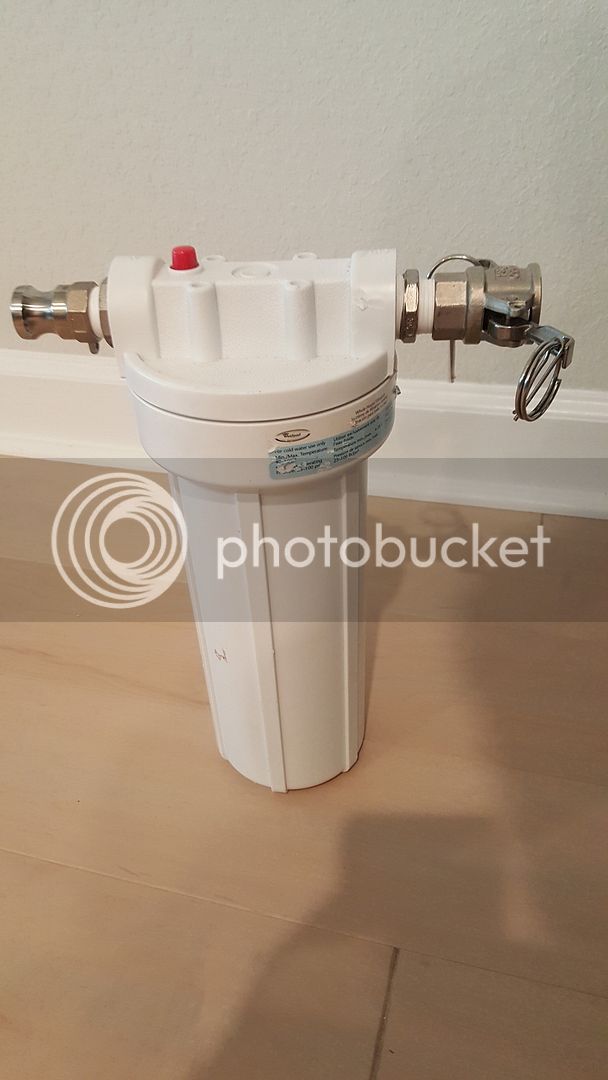
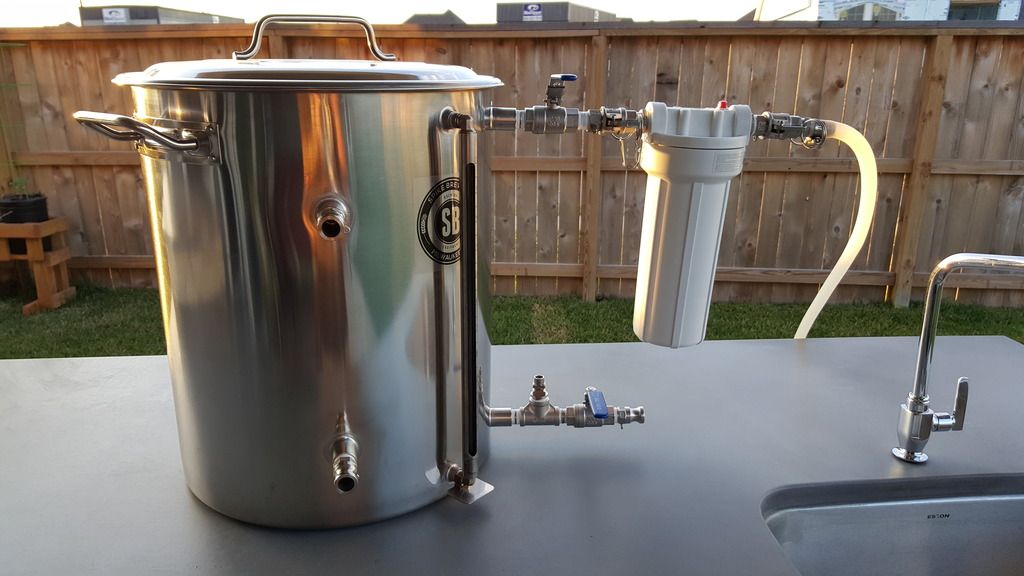


- Joined
- Dec 17, 2013
- Messages
- 806
- Reaction score
- 345
"whole house" typically means just that - a filter installed near where water enters the house, and all water entering the house goes through it.
BUT... be careful here - you can push water through a 10" x 2.5" sediment filter much faster than you can get adequate treatment running water through a 10" x 2.5" carbon block.
We would never recommend a 10" x 2.5" carbon block for instance to treat chlorinated water over about 0.5 gpm. Flow out of a garden hose may be 10 x that flow.
Flow in a 3/4" copper pipe would be around 11 gpm - way, way, way too fast for a 10"x 2.5" carbon block.
There are four commonly available/standard-sized carbon blocks - and the bigger the filter, the faster the flow they can handle. Best to keep flows at about half the max for chlorine removal.
10" x 2.5" Max flow is 1 GPM,
20" x 2.5", 2 GPM
10" x 4.5", 3 GPM
20" x 4.5", 6 GPM
Flows faster than that require multiple carbon blocks. But in practice, it's often more economical to go with a backwashing carbon tank at that point.
Also - it's good practice to install a sediment filter ahead of any carbon block. This will keep the sediment out of the block so the block can do what you want it to do.
Russ
BUT... be careful here - you can push water through a 10" x 2.5" sediment filter much faster than you can get adequate treatment running water through a 10" x 2.5" carbon block.
We would never recommend a 10" x 2.5" carbon block for instance to treat chlorinated water over about 0.5 gpm. Flow out of a garden hose may be 10 x that flow.
Flow in a 3/4" copper pipe would be around 11 gpm - way, way, way too fast for a 10"x 2.5" carbon block.
There are four commonly available/standard-sized carbon blocks - and the bigger the filter, the faster the flow they can handle. Best to keep flows at about half the max for chlorine removal.
10" x 2.5" Max flow is 1 GPM,
20" x 2.5", 2 GPM
10" x 4.5", 3 GPM
20" x 4.5", 6 GPM
Flows faster than that require multiple carbon blocks. But in practice, it's often more economical to go with a backwashing carbon tank at that point.
Also - it's good practice to install a sediment filter ahead of any carbon block. This will keep the sediment out of the block so the block can do what you want it to do.
Russ
user 163849
Well-Known Member
- Joined
- Jul 16, 2013
- Messages
- 296
- Reaction score
- 96
"whole house" typically means just that - a filter installed near where water enters the house, and all water entering the house goes through it.
BUT... be careful here - you can push water through a 10" x 2.5" sediment filter much faster than you can get adequate treatment running water through a 10" x 2.5" carbon block.
We would never recommend a 10" x 2.5" carbon block for instance to treat chlorinated water over about 0.5 gpm. Flow out of a garden hose may be 10 x that flow.
Flow in a 3/4" copper pipe would be around 11 gpm - way, way, way too fast for a 10"x 2.5" carbon block.
There are four commonly available/standard-sized carbon blocks - and the bigger the filter, the faster the flow they can handle. Best to keep flows at about half the max for chlorine removal.
10" x 2.5" Max flow is 1 GPM,
20" x 2.5", 2 GPM
10" x 4.5", 3 GPM
20" x 4.5", 6 GPM
Flows faster than that require multiple carbon blocks. But in practice, it's often more economical to go with a backwashing carbon tank at that point.
Also - it's good practice to install a sediment filter ahead of any carbon block. This will keep the sediment out of the block so the block can do what you want it to do.
Russ
I realize all that. The fact that I connected the filter to a single faucet does not change the fact that the manufacturer of the filter had labeled it Whole House Filter. I don't care what you call it, the reference was to what I used, not how I used it.
It is quite possible for me to run the water through the filter faster than the ideal rate but even at full flow the water from the filtered faucet has less chlorine flavor than that from the unfiltered faucet. I usually cut the flow down when filling the brew kettle but still use a campden tablet for good measure.

It is quite possible for me to run the water through the filter faster than the ideal rate but even at full flow the water from the filtered faucet has less chlorine flavor than that from the unfiltered faucet. I usually cut the flow down when filling the brew kettle but still use a campden tablet for good measure.
It is good that you also add the campden tab to the water. You really do have to reduce the flow rate through a carbon filter unit in order to provide complete chlorine compound removal from water. Pushing water through at too high a rate does mean that some of those chlorine compounds make it through into the brewing water. It takes incredibly little of those compounds in your wort to screw up your beer. The campden dose should solve that problem.
RationalRev
Well-Known Member
It is good that you also add the campden tab to the water. You really do have to reduce the flow rate through a carbon filter unit in order to provide complete chlorine compound removal from water. Pushing water through at too high a rate does mean that some of those chlorine compounds make it through into the brewing water. It takes incredibly little of those compounds in your wort to screw up your beer. The campden dose should solve that problem.
That's what I do. I used to fill 5 gallon water bottles at the grocery store until I realized that all they do is sell me reverse osmosis'd city water.
One of the blue Dupont filters plus a quarter Campden tablet has changed my brewing water game completely.
oregonparamedic
Well-Known Member
Here's my build up. I've since added a shut off valve to the water "in" side and left the PVC joints unglued so I can rotate the arm out of the way for the HLT lid between fills.

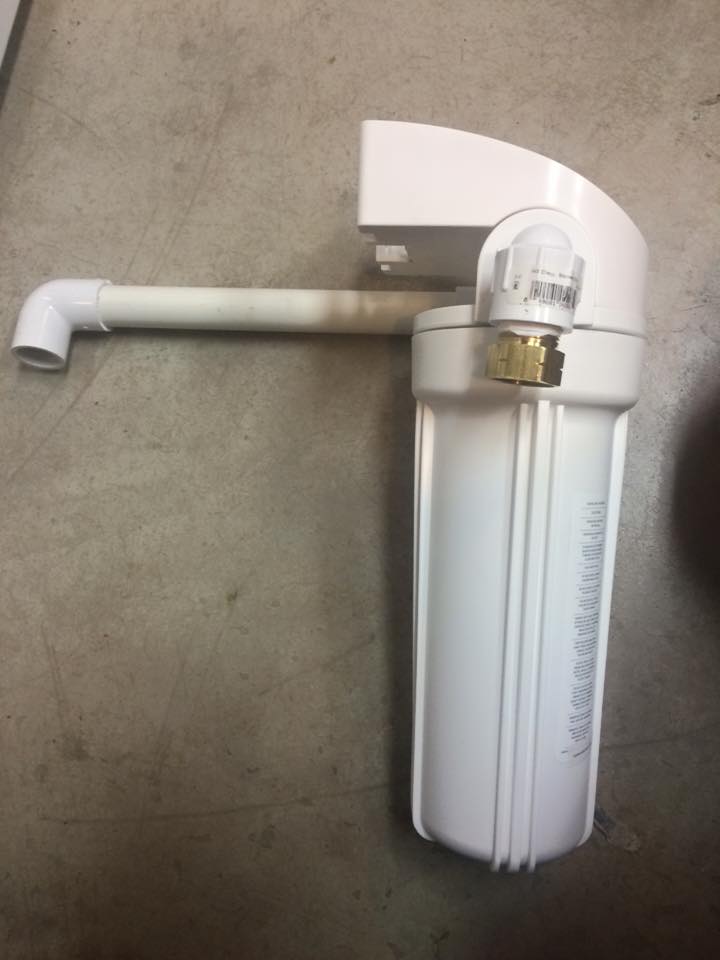
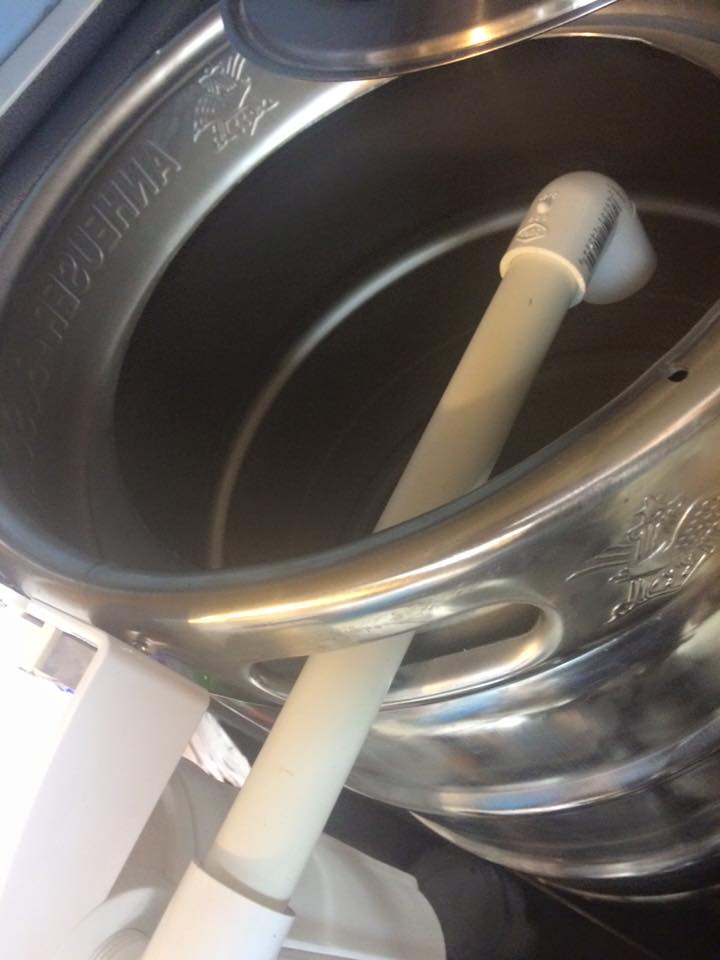
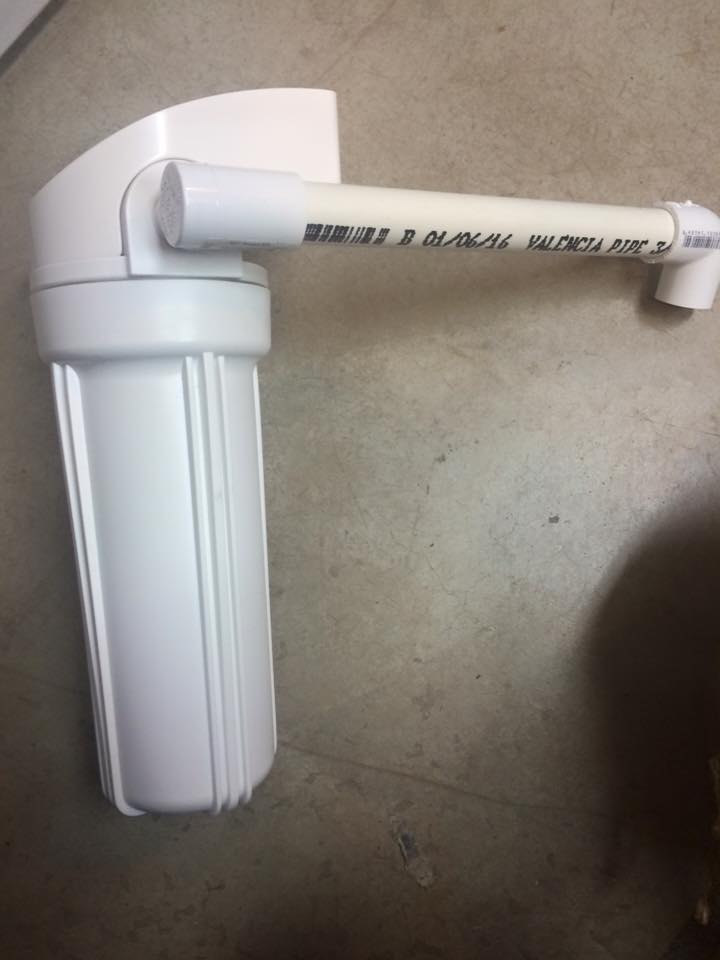






Wow, just starting getting into brewing and already a bit intimidated by all this. 
Not sure at all what the best water filter to get for brewing would be, looks like you guys all went with whole house water filters?
I'm finding differing opinions on water filters all over the place and I don't know who to believe. Do these sites seem accurate to you guys?
https://www.pelicanwater.com/whole-house-water-filter.php
http://www.justaddcleanwater.com
I really don't know where to start, don't even know if I really need a whole house water filter or if I can just get something smaller.. ??? THanks a lot for helping!
Not sure at all what the best water filter to get for brewing would be, looks like you guys all went with whole house water filters?
I'm finding differing opinions on water filters all over the place and I don't know who to believe. Do these sites seem accurate to you guys?
https://www.pelicanwater.com/whole-house-water-filter.php
http://www.justaddcleanwater.com
I really don't know where to start, don't even know if I really need a whole house water filter or if I can just get something smaller.. ??? THanks a lot for helping!
- Joined
- Dec 17, 2013
- Messages
- 806
- Reaction score
- 345
We provide whole-house systems for home brewers, but that typically is only in cases where the water is really bad. In most cases the water comes from a residential well. The system can run $500 to $5,000 or more and it can include multiple pieces of equipment. Which equipment? it all depends upon the contaminants in the water, and their concentration.
If you are on "city water," chances are your water is pretty good, and a whole house system, or even a whole house single filter isn't needed. You may need/want a POU (Point of Use) filter for your brewing water.
An easy place to start is by getting a copy of the annual report your water utility publishes to see which disinfectant they use. It will either be chlorine, or chloramine. If you need help interpreting the report feel free to email it to us and we'll take a look.
That pelican system you mentioned would not be a good choice. It is a whole house carbon filter used to remove the chlorine. Typically best not to remove the chlorine until you use the water. The chlorine is added as a disinfectant, and its best to let it serve that purpose.
Russ
If you are on "city water," chances are your water is pretty good, and a whole house system, or even a whole house single filter isn't needed. You may need/want a POU (Point of Use) filter for your brewing water.
An easy place to start is by getting a copy of the annual report your water utility publishes to see which disinfectant they use. It will either be chlorine, or chloramine. If you need help interpreting the report feel free to email it to us and we'll take a look.
That pelican system you mentioned would not be a good choice. It is a whole house carbon filter used to remove the chlorine. Typically best not to remove the chlorine until you use the water. The chlorine is added as a disinfectant, and its best to let it serve that purpose.
Russ
The chlorine is added as a disinfectant, and its best to let it serve that purpose.
Terrible things can happen when your home or business piping become contaminated with 'bad' things. While water disinfectants can impart undesirable taste and odor in the water, they are there for our protection. I don't ever want us to go back to the days when it wasn't there. For those that remember this, the Legionaire's Disease incident started from a hotel that used a whole facility disinfectant removal system and bacteria populating the shower heads. The result was deadly.
Removing the disinfectant at the point of use is wise.
Used this thread to make my set up, but last year I made a mistake with it. I keep my brew equipment in my unheated brew shed, and after brewing a batch in fall of 2015 I forgot to drain the rest of the water out of the canister. Some months later I go out to the shed and discover pieces of plastic on the floor where the filter canister blew apart from the water that froze inside.
Lesson learned, I make a mental note to drain it every time now.
Lesson learned, I make a mental note to drain it every time now.
natefrog255
Well-Known Member
- Joined
- Feb 5, 2012
- Messages
- 365
- Reaction score
- 3
Thought I might offer an update on the original post: You can still get all of the parts listed/shown at Lowes but whirlpool has gone to 3/8" fittings on the filter housing instead of what I think was 3/4" when johnsma22 put it together in 2007. The blue plastic line that comes with the filter (intended to hook up to your faucet) works great in place of the PVC and allows you to not build a mounting bracket. The whole setup cost about $60 last week.
Yes, bought a 3/4" male adapter from Menards yesterday and it was too big for the filter housing. I have the beer filtering kit from More Beer and just was using it with water filter. Want to build the PVC part to fill jugs up.
Similar threads
- Replies
- 3
- Views
- 362
- Replies
- 0
- Views
- 629
- Replies
- 0
- Views
- 489
